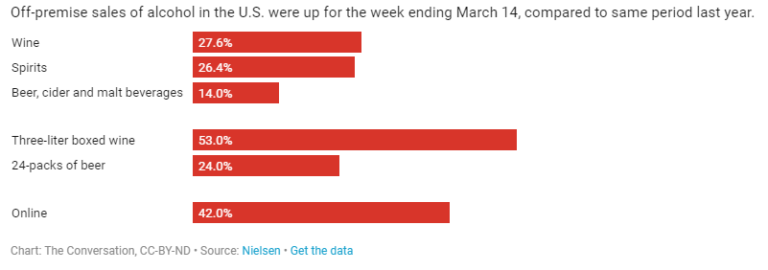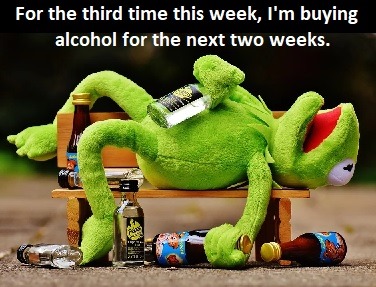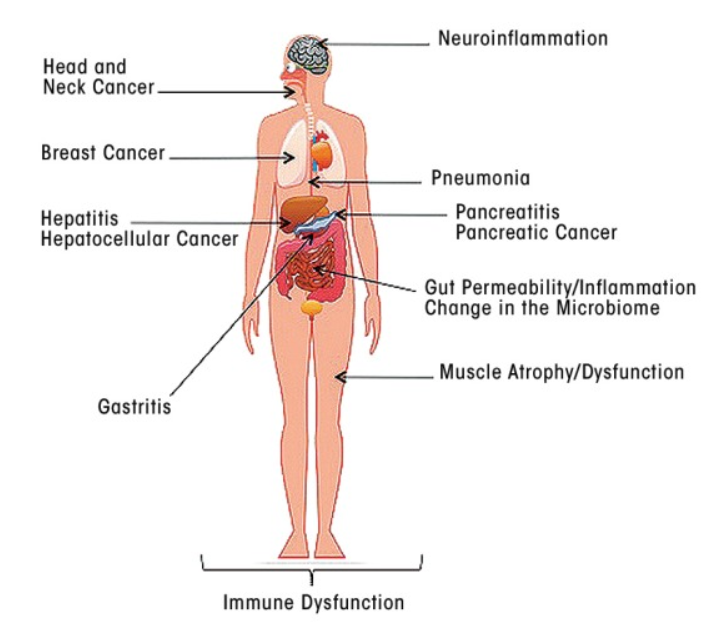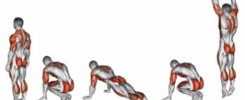Alcohol sale’s have spiked during this Covid crisis. The increased consumption may be due to boredom while being stuck at home, a way to reduce stress and anxiety, or a false belief that it will help prevent infection. Link to chart below is here.

There are some myths going around about alcohol consumption and the Covid virus. Myth 1: “Consuming alcohol destroys the virus” – Using isopropyl alcohol (rubbing alcohol) or 60-70% ethanol on your hands can kill some virus particles you have touched but consuming alcohol (ethanol) will not kill virus particles inside your body. First, because we inhale the virus and we swallow alcohol, and second, alcohol we consume is a much lower percent so it can’t kill viruses in your mouth.
Myth 2: “Alcohol stimulates immunity” – Alcohol has the exact opposite effect on immunity in any amount. The effects are dose-dependent; even one drink will inhibit immune cells and this effect increases with each consecutive drink. If you are at high risk of severe Covid symptoms – have heart disease, smoke, have COPD (chronic obstructive pulmonary disease), kidney problems, are older than 65, are diabetic or have other health issues then you should consider completely avoiding alcohol consumption during this pandemic.
It is hypothesized that alcohol consumption may remain high after the Covid crisis and we may see a future increase in alcohol dependence. Studies have shown that alcohol abuse or dependence increased in people working in high-risk settings during the SARS outbreak, after 9/11, and after Hurricane Katrina.

How alcohol affects your immune system
Effects increase proportionally with amount of alcohol consumed
- Increased susceptibility to pneumonia
- Greater likelihood of acute respiratory stress syndromes (ARDS)
- Slower recovery from infection
- Poor wound healing
- Significantly weakens innate and adaptive immune cells
- Alters the amount and diversity of beneficial organisms that live in the digestive tract – organisms that are important for regulating the immune response
- Damages epithelial cells that line the digestive tract – these cells are important barriers to prevent undigested molecules and toxins from entering the body and causing inflammation
- Inhibits T cells – cells that are part of the adaptive immune response that specifically target virus-infected cells
- Inhibits neutrophils – cells that are part of the innate immune response that are the first responders to an area of infection and play an important role in killing infectious organisms as well as attracting other immune cells to the area
- Puts a work load on the liver and therefore reduces the liver’s ability to keep up with its many other roles including immune functions. The liver contains phagocytic immune cells that help to fight bacterial and viral infections, and the liver produces immune proteins such as complement
- Alcohol disrupts the function of cilia in the upper respiratory tract that is needed for moving infectious organisms up and out of the lungs
- Impairs pulmonary (lung) immune cells that help to clear pathogens from the alveoli – the delicate air sacs where gas exchange occurs
- Weakens the lung epithelial cell barrier that normally helps to block pathogen entry – drinkers consistently have more severe lung infections than non-drinkers
- Increases inflammatory processes – inflammation is the series of events that increase blood vessel permeability that can lead to the more serious complications of a respiratory infection. As fluid leaves the blood vessels, the body’s attempt to bring more immune cells to the infected area, this effect can be over-stimulated and cause fluid to build up in the lungs contributing to ARDS. Over-stimulation of the inflammatory response also increases the amount of reactive oxygen species (free radicals) produce that damage our healthy tissue, making recovery from infection take much longer
- Chronic alcoholics are considered immunocompromised
- Alcohol also impacts every other system in the body including and increases the severity of other health issues including gastrointestinal disorders, liver disease, abdominal obesity, nervous system disorders, mood disorders, carbohydrate metabolism issues such as diabetes, nutritional deficiencies, inflammatory conditions, cancer, and inhibits muscle growth.
Alcohol in any amount modulates the function of nearly all components of the immune response. In small amounts and when people are healthy, these effects are not noticeable, but when there is a high risk of infection with a virus like Covid, it may be worth considering that it might not be a good time period to inhibit any immune functions.
For interest, below is an overview of the effects of chronic alcohol consumption that are caused by altering immune functions.as

Related article – How Vitamin D increases immune functions
Related article – How the immune system fights viral infections

